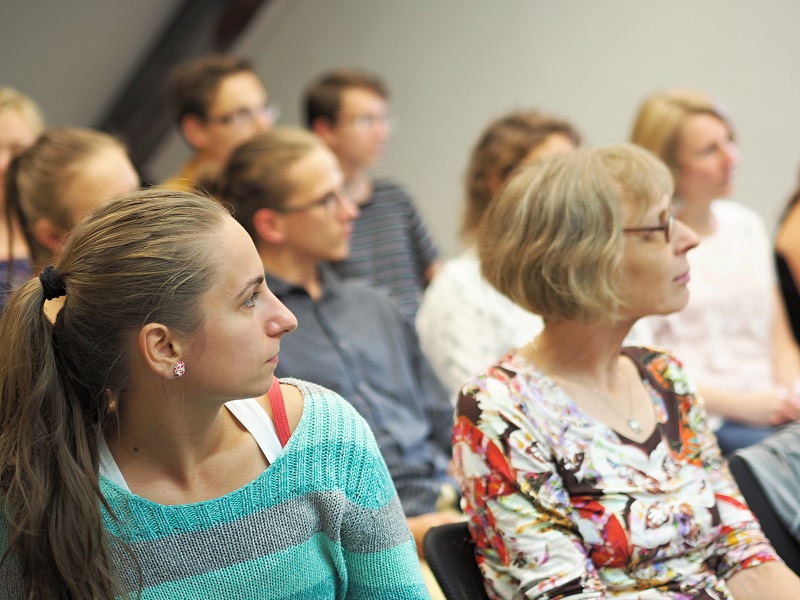ALGATECH – The Centre of Algal Biotechnology evolved from the Laboratory of Algal Research, founded in 1960 in Třeboň. Throughout its history, the Třeboň’s site of the Institute of Microbiology of the CAS has focused on microscopic algae and their use in food and feed industries and in human and veterinary medicine. At present, the ALGATECH Centre is an internationally recognised centre for basic and applied research of microalgae, cyanobacteria and photosynthetic bacteria, including the development of algal biotechnology. It is the largest centre of microalgae research in the Czech Republic.The ALGATECH Centre is housed in the historic building of Opatovický Mill from the 18th century, which has been recently renovated. The Centre also operates unique thin - layer cultivation units for autotrophic cultivation and a biotechnological hall for heterotrophic cultivation of microalgae, including the equipment for processing algal biomass. The Centre is known for its excellent research in photosynthesis and algal cell cycles.
New publication
New Article in Nature Microbiology
An international research team, including scientists from the Algatech Centre of the Institute of Microbiology of the Czech Academy of Sciences, has described a new type of light-harvesting apparatus in marine archaea. A study published in the prestigious journal Nature Microbiology shows that these microorganisms use rhodopsins with additional carotenoid antennas to more efficiently capture light energy.
read moreHow do the mysterious Swan Lake bacteria capture solar energy?
An international team led by Czech microbiologists managed to describe a unique apparatus by which special bacteria from a lake in the Gobi Desert capture sunlight.
Qian P, Gardiner AT, Šímová I, Naydenova K, Croll TI, Jackson PJ, Nupur, Kloz M, Čubáková P, Kuzma M, Zeng Y, Castro-Hartmann P, van Knippenberg B, Goldie KN, Kaftan D, Hrouzek P, Hájek J, Agirre J, Siebert CA, Bína D, Sader K, Stahlberg H, Sobotka R, Russo CJ, Polívka T, Hunter CN, Koblížek M (2022) 2.4- Å structure of the double-ring Gemmatimonas phototrophica photosystem. Science Advances 8(7):eabk3139►
Long awaited review published
For decades, microbiologists have been studying Crocosphaera watsonii, a type of algae abundant in tropical and subtropical ocean waters. During the day, they convert carbon dioxide into sugar, and at night convert nitrogen into protein. Using these abundant gases allows them to fertilize the ocean, contributing to its carbon and nitrogen budgets. In a new paper, Takako Masuda, Jan Mares and Ondrej Prasil from Centre Algatech of the Institute of Microbiology CAS with colleague from University of Rhode island provide a long-awaited review and appreciation of this important single-cell organism. Reed more►
Media
Production of bioplastics by cyanobacteria
PlastoCyan - the production of bioplastics by cyanobacteria using wastewater is an interesting topic even beyond the borders of the Austria-Czech Republic Interreg program. Bioplastics Magazine, the only global trade journal focussing on (biodegradable) plastics made from renewable resources, published a pop-science article about the project. Read more►
Important events
Visit of the Academy Council of the Czech Academy of Sciences at the ALGATECH Centre
On October 29, 2024, we had the honor of welcoming members of the Academy Council of the Czech Academy of Sciences to the ALGATECH Centre.
read moreALGAE4FISH
Final meeting of INTERREG AT CZ project ALGAE4FISH. It was great to see all Czech and Austrian partners in person again. Thanks to Southbohemian University (CZ), BEST GmbH (AT), BAW (AT) and Institute of Microbiology (CZ) for research - how microalgae and rotifers can improve survival rate and health of pikeperch larvae in first weeks of their life. They are able to convert alpha-linolenic fatty acid (FA) from our Chlorella strain into DHA (FA) important for proper tissue development and prevent malformations. Survival rate increased and makes more profit for fish farmers. Utilisation of waste nutrients from waste water or digestate (waste from biogas plant) is ecoinovative bonus! Technology is now available even for marine fish larvae.
Achievements
Sigma Project Award
We are delighted to announce that our successful PhD student and future new postdoc of the algal bio-refinery group, Miss Daniela Bárcenas Pérez, has been awarded a Sigma project by the Technology Agency of the Czech Republic. The objective of the project "Advanced manufacturing based on countercurrent separation to refine microalgae biomass into marketable bioactive pigments" (PigmenTech) is to develop a new manufacturing process based on countercurrent separation (CCC) for the commercial production of lutein, cantaxanthin and astaxanthin diesters from microalgae. R&D activities start at laboratory scale (TRL3) and will be transferred to a real industrial environment, leading to an efficient commercial manufacturing process for the production of biopigments with direct commercial applications. Photo credit: Richard Lhotský, MBÚ
Successfully completed
ALGATECH Centre - Inst. Microbiol. Czech Acad. Sci. (IMIC) has successfully completed the commercialization process of its unique microalgae strain Parachlorella! Read more►
“Microbe of the Month.”
The research team of the Laboratory of Anoxygenic Phototrophs at the Institute of Microbiology of the Czech Academy of Sciences (Centre ALGATECH in Třeboň) has received significant international recognition. The bacterium they described, Chloracidobacterium validum, was selected as “Microbe of the Month” by the British Microbiology Society.
read moreCorrespondence Address
Institute of Microbiology, CASCentre Algatech
Novohradská 237 - Opatovický mlýn
379 01 Třebon, Czech Republic
Billing Address
Institute of Microbiology, CAS
Vídeňská 1083
142 00 Prague 4, Czech Republic
VAT ID: CZ61388971
Data box: ndpn2cp
Bank Connection
Komerční banka, a.s.
Account No.: 2246660227/0100
SWIFT: KOMBCZPPXXX
IBAN: CZ76 0100 0000 0022 4666 0227
